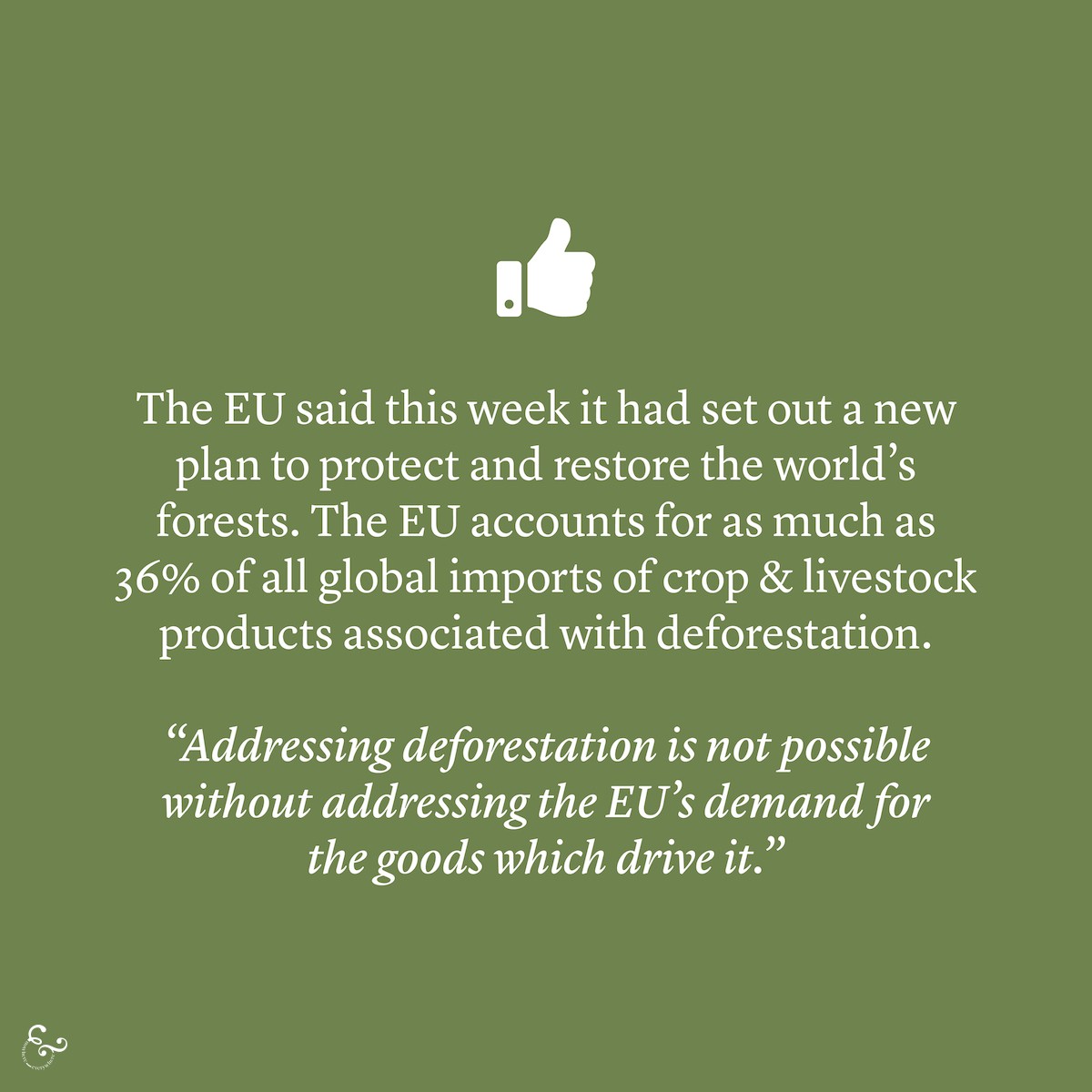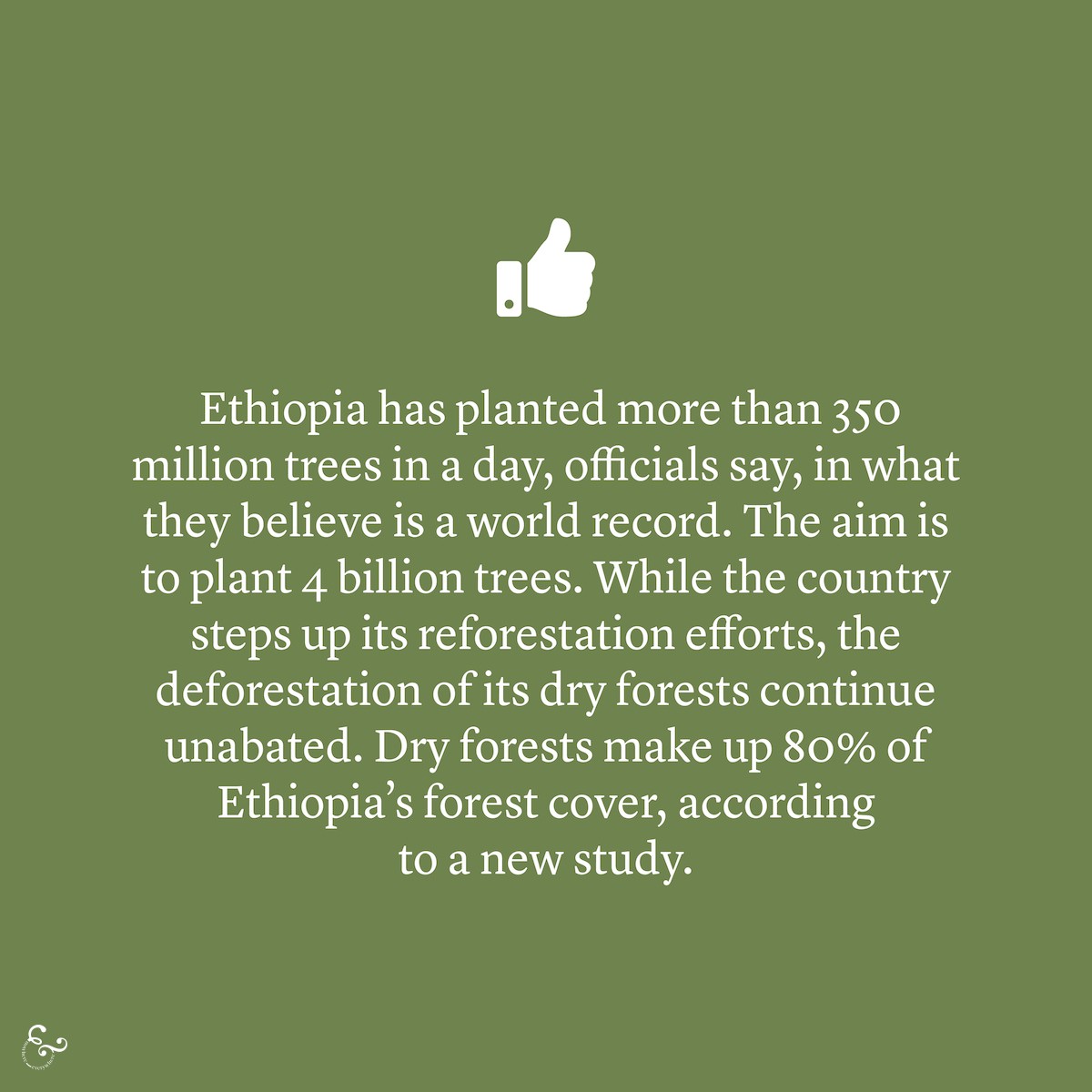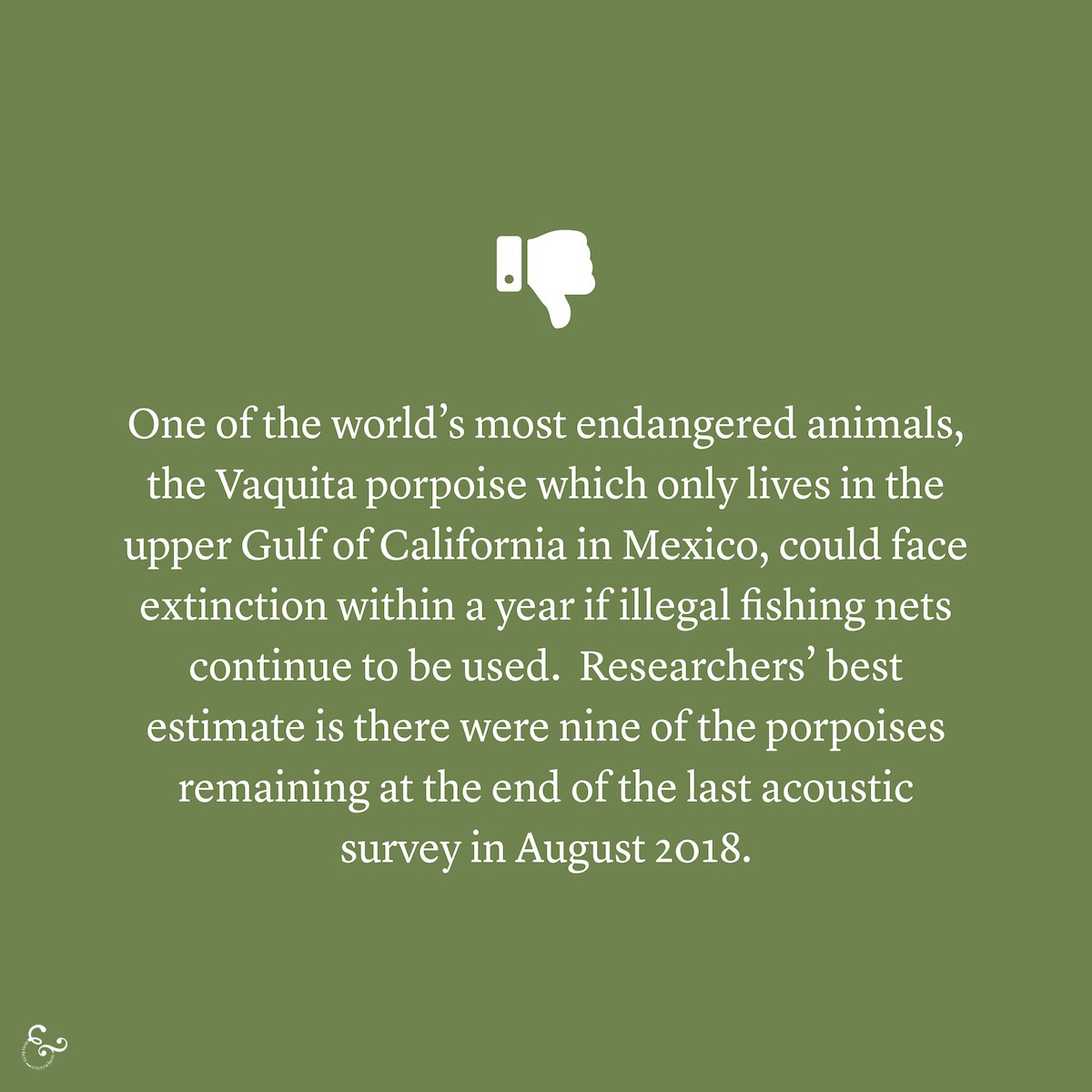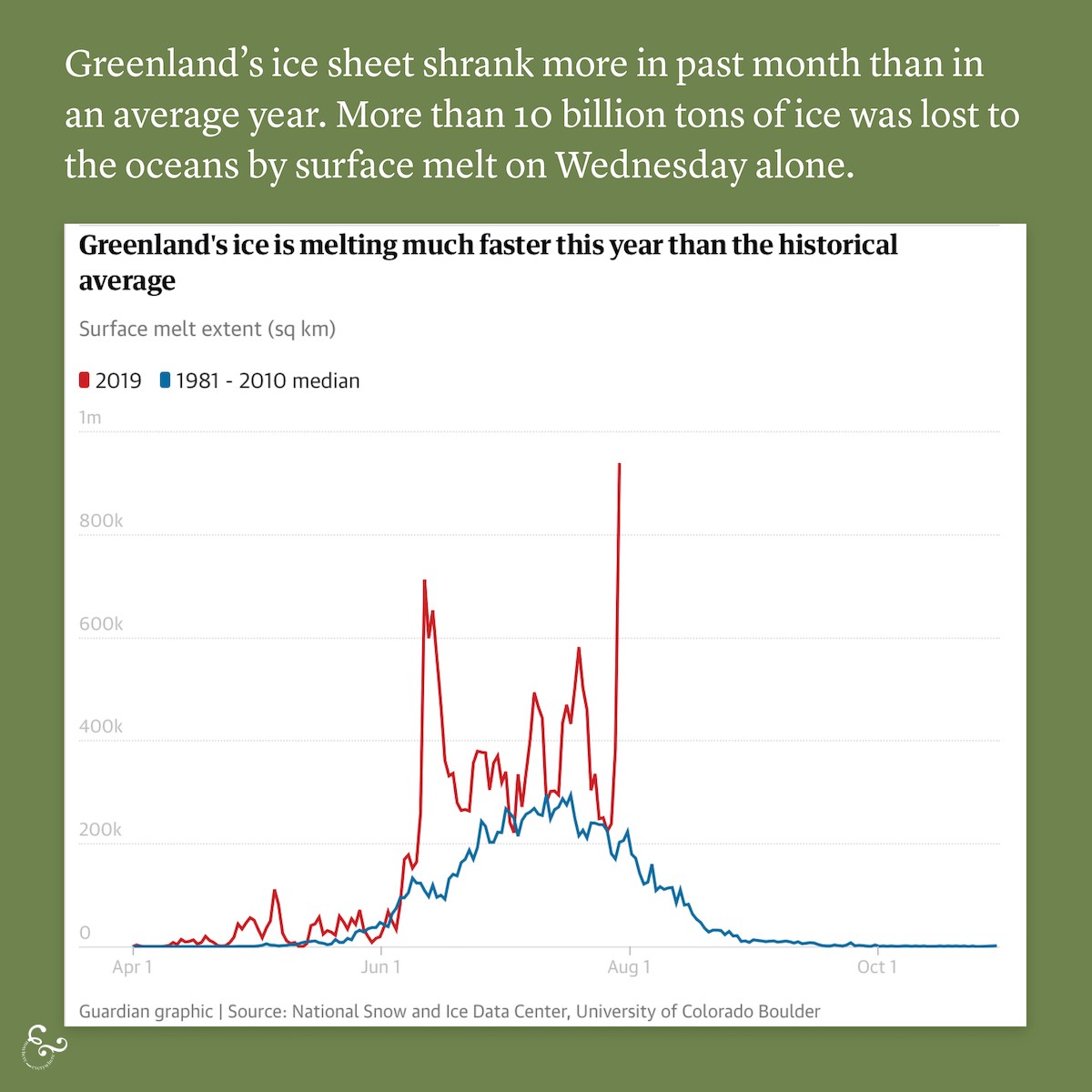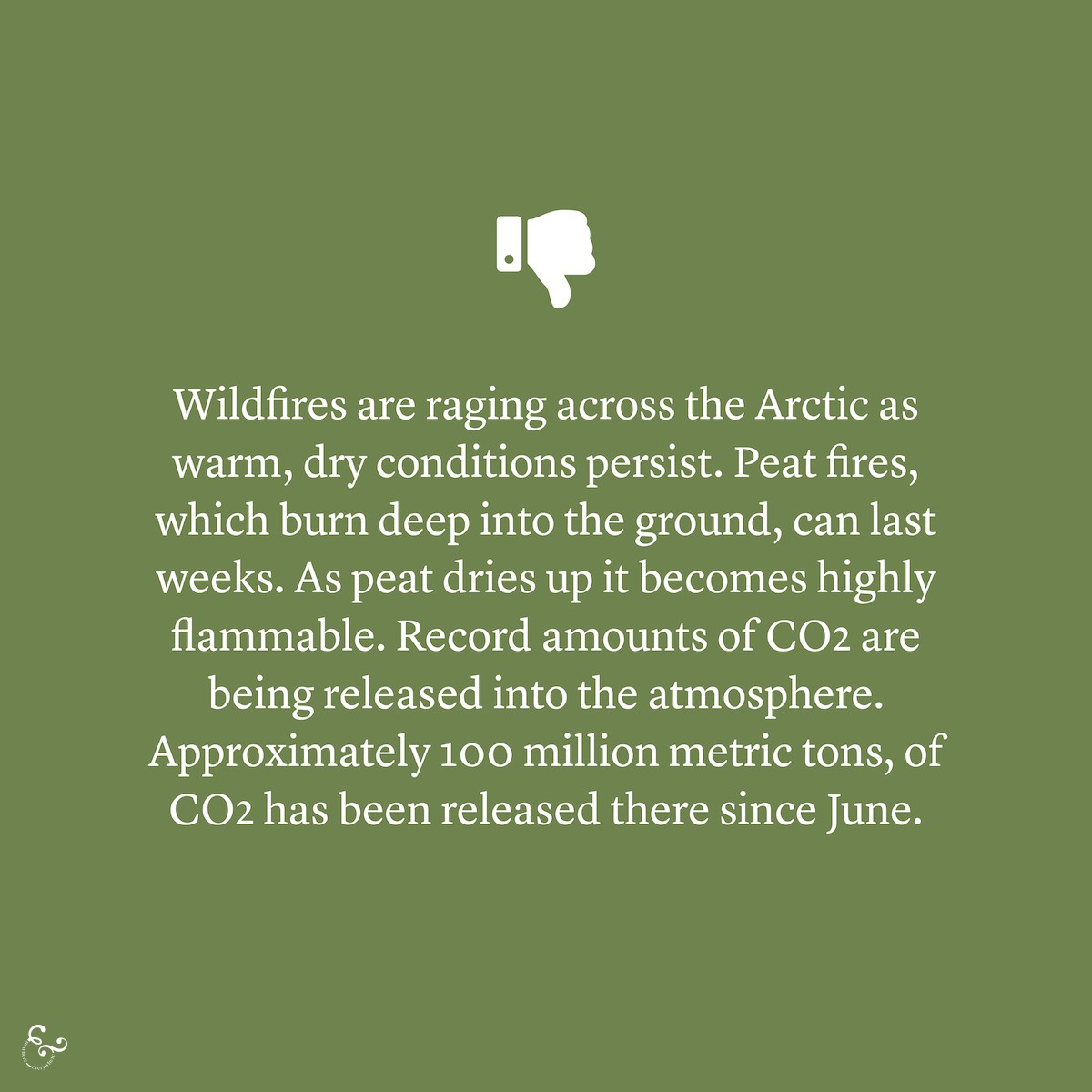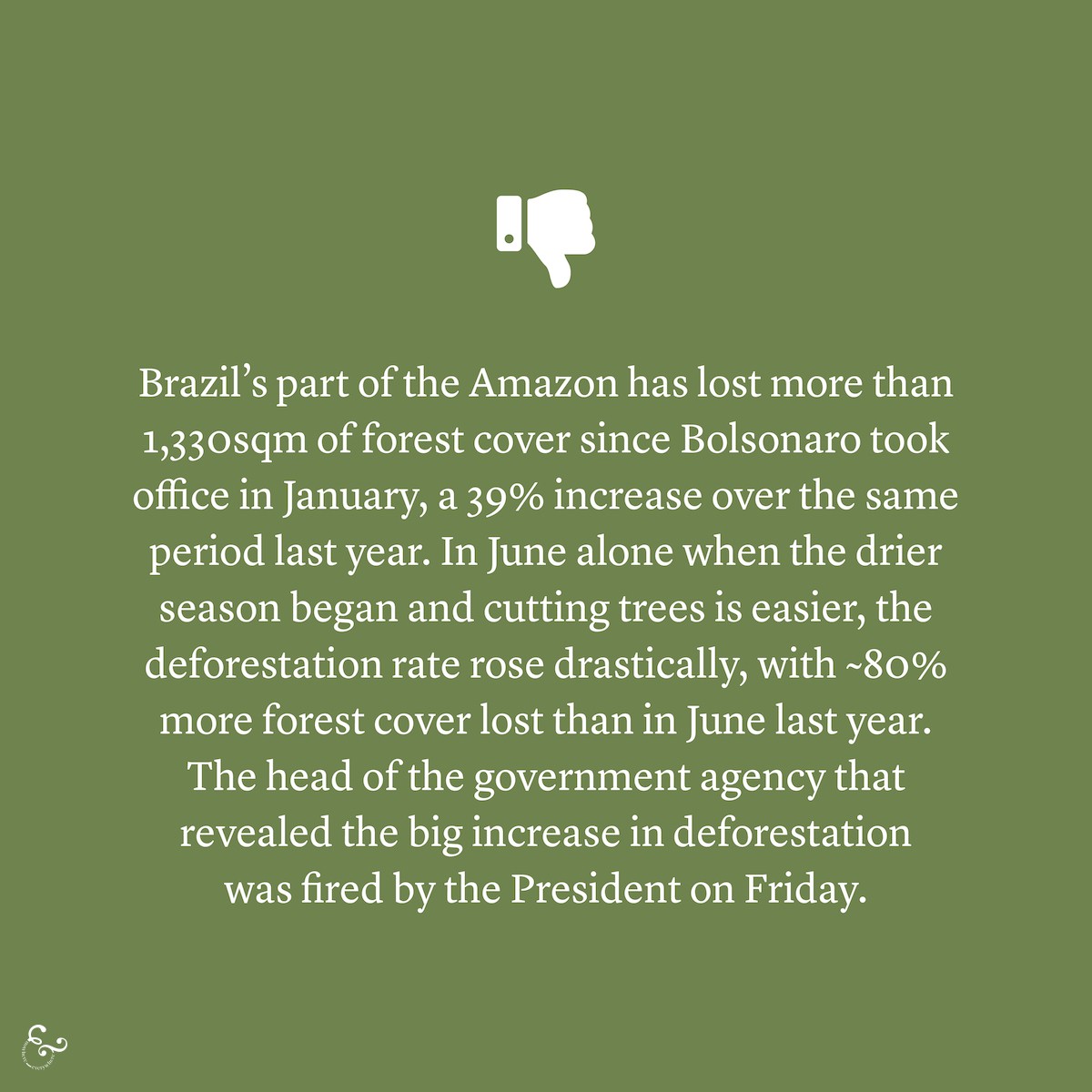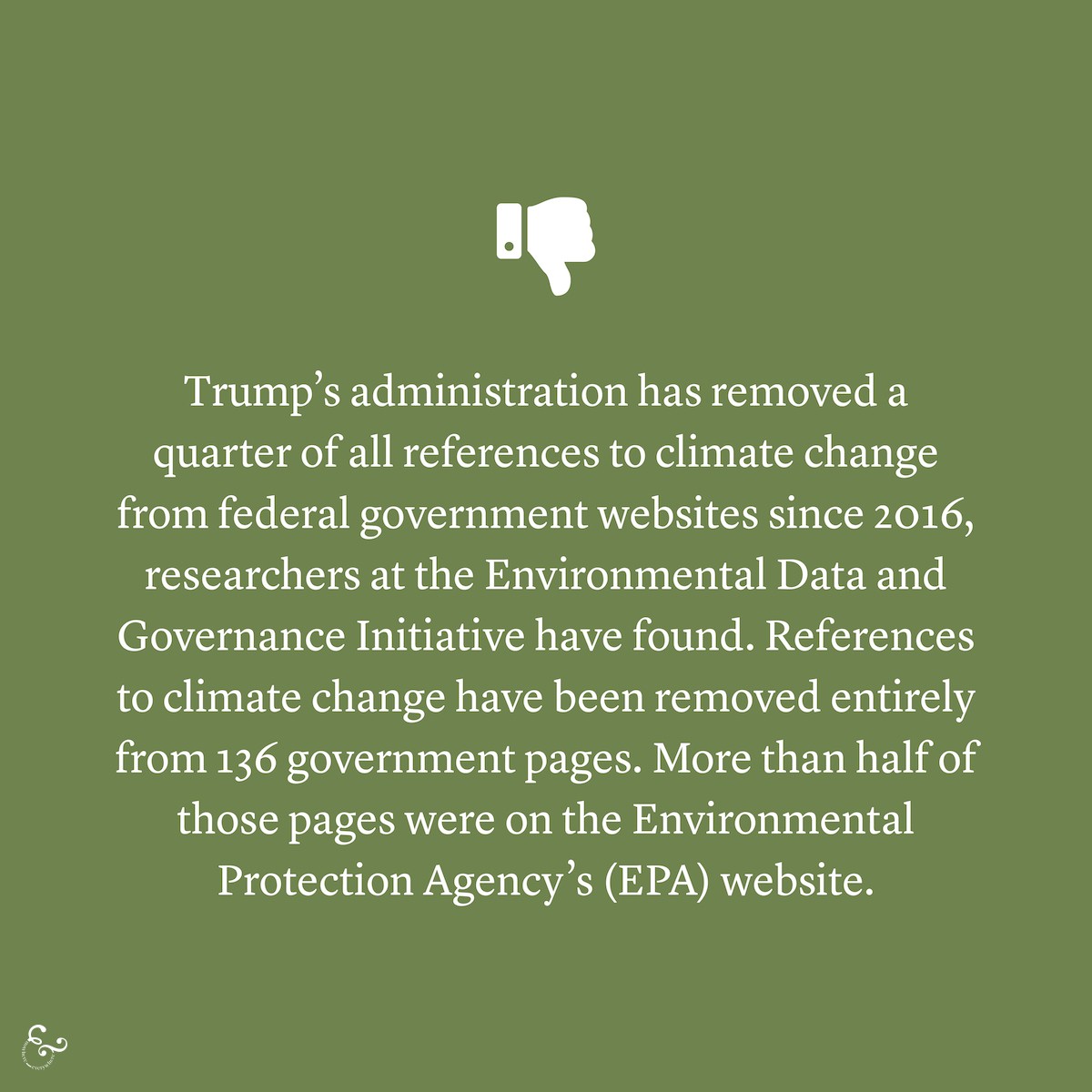Brazil / Deforestation
1/ Brazil’s part of the Amazon has lost more than 1,330 square miles of forest cover since Mr. Bolsonaro took office in January, a 39 percent increase over the same period last year. In June alone, when the cooler, drier season began and cutting trees became easier, the deforestation rate rose drastically, with roughly 80 percent more forest cover lost than in June of last year. Additionally, a New York Times analysis of public records found that such enforcement actions by Brazil’s main environmental agency fell by 20 percent during the first six months of the year. The head of the government agency that had revealed the big increase in deforestation in the Amazon was fired by the President on Friday. (NYT / Economist / NYT 2)
Arctic / Climate Change
2/ Wildfires are raging across the Arctic as warm, dry conditions persist across the region. Satellite images have revealed wildfires burning in Alaska, Greenland and throughout Siberia. Peat fires, which burn deep into the ground, can last weeks. As peat dries up it becomes highly flammable. As the Arctic’s fires continue to burn, record amounts of CO2 are being released into the atmosphere as peat stores a lot of carbon. Greenpeace estimates 3.3 million hectares were burning across Russia, bigger than the territory of Belgium. Approximately 100 million metric tons, of CO2 has been released there since June. Siberia also saw massive fires last year, the year before, and the year before that. (Smithsonian/ Wired / BBC / Vox)
United States / Climate Change
3/ Donald Trump’s administration has removed a quarter of all references to climate change from federal government websites since 2016, researchers at the Environmental Data and Governance Initiative (EDGS) have found. The EDGS analysis found references to climate change had been removed entirely from 136 government pages. More than half of those pages were on the Environmental Protection Agency’s (EPA) website. Trump has repeatedly dismissed climate change as a “hoax”, ignoring the scientific consensus and even warnings from his own federal agencies. (Independent)
Mexico / Animals
4/ One of the world’s most endangered animals, the Vaquita porpoise which only lives in the upper Gulf of California in Mexico, could face extinction within a year if illegal fishing nets continue to be used. Researchers’ best estimate is there were nine animals remaining at the end of the last acoustic survey in August 2018. (Independent / Phys)
World / Climate Change
5/ Greenland’s ice sheet shrank more in past month than in average year, experts warn. Temperatures have been 10C or more above normal this week. More than 10 billion tons (11 billion U.S. tons) of ice was lost to the oceans by surface melt on Wednesday alone. A mere 1 billion tons — or 1 gigaton — of ice loss is equivalent to about 400,000 Olympic-sized swimming pools. Extreme heat waves are now occurring at least 10 times more frequently than a century ago. (The Guardian / AP News / Washington Post)

Adam (Research Fellow), is back on The Conversation writing about the Albany Pitcher plant. The species has declined dramatically over the past century as extensive land has been cleared throughout the southwest for agriculture and urban development. Recent survey efforts suggest that fewer than 20 populations of the Albany pitcher plant still exist, and fewer than 5,000 plants remain. It still has no formal conservation status. (The Conversation)
The good news…
EU / Deforestation
6/ The EU said this week it had set out a new plan to protect and restore the world’s forests, which involves working with governments to promote better use of land and resources, managing supply chains, and carrying out research. The EU accounts for as much as 36% of all global imports of crop and livestock products associated with deforestation, according to the World Wide Fund for Nature. “Addressing deforestation is not possible without addressing the EU’s demand for the goods which drive it.” (The Guardian)
Brazil / Deforestation
7/ A joint report from the Brazilian National Institute for Space Research (INPE) and NGO Fundação SOS Mata Atlântica based on satellite imaging shows an annual reduction of 9.3 percent in deforested areas in the Mata Atlântica. No large tropical forest ecosystem has suffered as much loss as the Mata Atlântica, also known as the Atlantic Forest.
UK / Animals
8/ Sand dunes home to rare British toads and lizards get £4m conservation boost. Habitat home to 70 rare species including natterjack toads, sand lizards and fen orchids. (Independent)
Ethiopia / Deforestation
X/ Our note: We’re going to notch it up to a good thing, but there are two sides to this story. Ethiopia has planted more than 350 million trees in a day, officials say, in what they believe is a world record. The UN says Ethiopia’s forest coverage declined from 35% of total land in the early 20th Century to a little above 4% in the 2000s. The aim is to plant 4 billion trees. While the country steps up its reforestation efforts, the deforestation of its irreplaceable dry forests continue unabated. Dry forests make up 80 percent of Ethiopia’s forest cover, according to a new study which analyzed the 17 million hectares of Ethiopia’s forest cover. (BBC / CIFOR)
Other notables…
- Thirty prominent Canadian and U.S. experts in conservation biology and biodiversity have written to Minister of Environment and Climate Change Catherine McKenna, calling on the Liberal government to do more. The letter calls on the government to prioritize creation of large Indigenous Protected and Conserved Areas (IPCAs) across Canada. (RCI)
- Leading architects and engineers are calling for all-glass skyscrapers to be banned because they are too difficult and expensive to cool. (The Guardian)
- Ohio just passed the worst energy bill of the 21st century. The bill would subsidize four uncompetitive power plants, remove all incentive to build more renewable energy projects, and cancel efforts to help customers use less energy. It is a bill only a utility (and the lawmakers who do its bidding) could love. (Vox)
- We passed the global Earth Overshoot day, marking the day where we have used up all the resources the Earth can replenish in a year. We wrote a little about it on Instagram too. (Footprint Network)
- We can’t expand airports after declaring a climate emergency – let’s shift to low-carbon transport instead. (The Conversation)
- The New Zealand government has proposed new fuel standards to cut greenhouse emissions, along with consumer rebates for cleaner cars. Russia and Australia are the last remaining OECD nations without fuel efficiency standards. (The Conversation)
- Plastic bag sales in England down by a third in last year. Overall, sales of single-use bags by big supermarkets have fallen 90% since 5p charge introduced. (The Guardian)
- Climate change is “absolutely” already causing deaths, according to a new report on the health impacts of the climate crisis in Australia & the Pacific, which also predicts climate-related stunting, malnutrition and lower IQ in children within the coming decades. (The Guardian)
- A southern white rhino has been born at San Diego Zoo, California, following artificial insemination. The mother, Victoria, is one of six potential surrogate mothers that could be used to save the population of northern white rhinos, of which there are only two left in existence. (BBC)
- More than 160 environmental defenders were killed in 2018 and many others labeled terrorists and criminals. In its report, Global Witness makes clear that its tally of land defenders murdered is almost certainly an undercount. (The Intercept)
- Hotels are finally banning mini plastic toiletries (The Guardian)
- About 200 reindeer have been found dead from starvation in the Arctic archipelago Svalbard, an unusually high number, the Norwegian Polar Institute has said, pointing the finger at climate crisis. The increased mortality is also due in part to a significant increase in the number of reindeer in the Norwegian archipelago. That is partly thanks to climate crisis and the warmer summers. (The Guardian)
- The UK will have to plant 1.5 billion trees if it is to meet its pledge to reach net zero emissions by 2050 – and this needs to “happen quickly”, government advisers have warned. (Independent)
- Greta Thunberg is to sail across the Atlantic in a high-speed racing yacht next month to attend UN climate summits in the US and Chile. The yacht is fitted with solar panels and underwater turbines to generate zero-carbon electricity. (The Guardian)
- Australia has just experienced its third-hottest July on record, beaten only by records set in 2017 and 2018, as fire and water authorities in the eastern states prepare for a worse than average fire season. he mean maximum temperature in July was 2.23C above average. The warm winter follows Australia’s hottest ever summer. (The Guardian)
- In what officials believe to be an airport first, San Francisco International Airport (SFO) announced that it’s banning the sale of plastic water bottles on its premises. The move is part of the travel hub’s goal of becoming the world’s first zero-waste airport by 2021. There are now nearly 100 water refill stations throughout the airport. (Huffington Post)
Bearded vultures soar again in Alps after breeding scheme. A record 35 bearded vulture chicks are expected to leave their nests and take to the skies to patrol their mountain home, in one of the most successful wildlife comebacks of recent times. (The Guardian)

